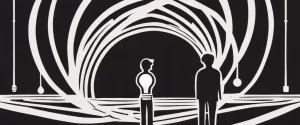
In the realm of historical literature, numerous accounts have chronicled the events of the past, understanding pivotal moments that have shaped the course of humanity. Among these works, two prominent books, “Is Paris Burning” by Larry Collins and “The Vanquished” by Robert Gerwarth, stand out for their painstaking exploration of significant historical events. Both books delve into the turbulent and transformative periods of the twentieth century, offering unique perspectives on the aftermath of World War II.
As two comprehensive studies occupying different spheres of this era, Collins’ “Is Paris Burning” examines the liberation of Paris during the Second World War, while Gerwarth’s “The Vanquished” illuminates the multifaceted repercussions of the Great War. By comparing these two influential works, a nuanced understanding of the complexity and repercussions that events such as wars can have on societies and nations can be achieved.
Published in 1965, “Is Paris Burning” presents a gripping account of the liberation of Paris in August 1944. Co-authored by Larry Collins and Dominique Lapierre, the book meticulously reconstructs the battle for the French capital, discussing the resistance efforts of the French citizens, controversies surrounding General Dietrich von Choltitz’s decision to spare or destroy the city, and the collaboration between the French resistance and Allied forces.
Released in 2016, “The Vanquished” provides a comprehensive examination of the immediate aftermath of the First World War, focusing on the nations who lost the conflict and overlooked narratives of the peacemaking process. Gerwarth meticulously dissects the turbulent years following the war, exploring the decline of empires, the rise of fascism, the Bolshevik Revolution, and the emergence of new nation-states amidst widespread social, political, and economic upheaval.
Through a deep comparative analysis of these two influential works, this study aims to shed light on the interconnectedness of historical events, their impact on societies, as well as the transformative consequences that wars can bring. By exploring the contrasting focal points and perspectives, we can delve into the complex narratives of wartime liberation, post-war rebuilding, and the formation of new orders that shaped the twentieth-century Europe.
This comparative study holds immense significance as it explores the enduring legacies of two major wars and their aftermath. By examining Collins’ vivid retelling of the liberation of Paris and Gerwarth’s comprehensive analysis of post-World War I, this study seeks to illuminate the commonalities and divergences in historical narratives. Furthermore, it aims to deepen our understanding of how differing historical perspectives shape our comprehension and interpretation of the complexities of the past.
As we embark on this comparative journey through history, delving into the events analyzed by Larry Collins and Robert Gerwarth in their respective works, “Is Paris Burning” and “The Vanquished,” we anticipate gaining new insights into the far-reaching effects of these turbulent periods. By unraveling narratives that have shaped our present reality, this study aims to highlight the vital lessons history teaches us and encourages us to reevaluate our understanding of the tumultuous periods and their significance.
Brief Summary of Two Books
Is Paris Burning by Larry Collins
“Is Paris Burning?” by Larry Collins is a historical novel that recounts the events leading up to and during the liberation of Paris in World War II. The book focuses on the August 1944 uprising against German occupation and follows multiple key figures involved in the resistance movement. It delves into the strategizing and planning of the uprising, the intense battles fought in the streets of Paris, and the negotiations with German officials to ensure the city would not be destroyed. Is Paris Burning?” paints a vivid picture of the courage and determination displayed by both the French resistance fighters and the Allied forces who fought to liberate the city from Nazi control.
The Vanquished by Robert Gerwarth
“The Vanquished: Why the First World War Failed to End” by Robert Gerwarth is a comprehensive examination of the aftermath and impact of World War I. Gerwarth challenges the commonly held belief that the Treaty of Versailles alone led to the rise of Nazism and the outbreak of World War II. Instead, he argues that the real consequences of the war went much deeper and were far-reaching.
Gerwarth analyzes the major historical events that followed the armistice and the series of peace treaties that were signed in the wake of World War I. He explores how these treaties failed in their goal to create lasting peace and stability in Europe. Additionally, Gerwarth explores how the war reshaped societies, fueled tensions, and laid the foundations for future conflicts.
The author examines the impact of the war on individual nations, including Germany, Italy, Austria, Hungary, Russia, and the Ottoman Empire. Gerwarth highlights the political turmoil, social unrest, and economic struggles that these countries experienced in the aftermath of the war, which ultimately contributed to the rise of authoritarian regimes and the breakdown of democratic systems.
“The Vanquished” provides a nuanced understanding of the complex and interconnected factors that led to the rise of fascism, as well as the unraveling of the international order established after World War I. Gerwarth’s work challenges traditional historical narratives by highlighting the profound and lasting impact of the war on both a global and individual level.
Comparison between Two Books

Similarities in History of Wars
Both “Is Paris Burning” by Larry Collins and “The Vanquished” by Robert Gerwarth explore the history of wars, focusing on different aspects of conflict and its impact. Although the books cover different periods and wars, they share several similarities in terms of their historical narratives and approaches.
1. In-depth Historical Analysis: Both authors provide extensive research and analysis of their respective wars. They delve into historical archives, personal accounts, and official documents to present a comprehensive understanding of the conflicts.
2. Multiple Perspectives: Rather than focusing solely on military strategies and leaders, both books broaden the narrative by including various perspectives. They portray the experiences of civilians, resistance fighters, politicians, collaborators, and occupiers to provide a more nuanced depiction of the war’s impact on different societal groups.
3. Sieges and Occupations: Both books cover the aspect of sieges and occupations. “Is Paris Burning” explores the Nazi occupation of Paris during World War II, examining the resilience of French civilians and the efforts to liberate the city. “The Vanquished” delves into the occupied territories of Europe after World War I, examining the social and political consequences of foreign rule.
4. Resistance Movements: Both works shed light on resistance movements during wartime. “Is Paris Burning” highlights the French Resistance movement, detailing their sabotage efforts and collaboration with Allied forces. “The Vanquished” explores various resistance movements across different countries during World War I and their efforts to regain independence.
5. Consequences and Rebuilding: Both books devote significant attention to the aftermath of the wars they cover. They examine the challenges faced by the defeated nations, including the process of rebuilding, political transformation, and the pursuit of justice for war crimes.
6. Interplay of Individual Stories: Both authors interweave individual stories and anecdotes throughout their narratives. By focusing on specific individuals, they humanize the historical events and allow readers to connect with the personal experiences of those involved.
Despite their differences in subject matter and time period, “Is Paris Burning” and “The Vanquished” share common thematic elements. Both books explore the complexities of war, the resilience of individuals and societies, and the human impact of conflict. By incorporating multiple perspectives and thorough research, they provide illuminating accounts of historical events and the lasting consequences of war.
Divergences in History of Wars
Is Paris Burning by Larry Collins and The Vanquished by Robert Gerwarth are both historical books that discuss different aspects of wars. However, there are key differences in their approach and focus on history, resulting in a divergence in how they present the history of wars.
1. Scope and Focus:
– “Is Paris Burning” primarily focuses on the liberation of Paris during World War II and the events leading up to it. The book delves into the military strategies, political decisions, and individual stories of resistance fighters and German occupiers. It offers a detailed account of the battle for Paris, highlighting the role of key figures like Charles de Gaulle.
– On the other hand, “The Vanquished” takes a broader approach and covers the aftermath of World War I. The book explores the experiences of the defeated nations, such as Germany, Austria-Hungary, and the Ottoman Empire. It analyzes the societal, political, and cultural consequences of the war, including the rise of fascism, the collapse of empires, and the redrawing of borders.
2. Narrative Style:
– “Is Paris Burning” is written in a more narrative style, emphasizing the personal stories of individuals involved in the events surrounding the liberation of Paris. The book reads like a thrilling account of the battle, emphasizing the dramatic moments and heroic acts of resistance fighters.
– In contrast, “The Vanquished” adopts a more scholarly approach and offers a comprehensive analysis of the aftermath of World War I. It is based on extensive research and focuses on historical context, political developments, and the long-term implications of the war. The book provides a more nuanced and analytical perspective, aiming to delve deeper into the complexities of post-war societies.
3. Geographical Focus:
– As the title suggests, “Is Paris Burning” primarily focuses on Paris and the liberation of the French capital. The book maintains a narrow geographical scope, allowing for greater depth and detail in its account of the specific events in and around Paris.
– Conversely, “The Vanquished” covers a wide range of geographical areas affected by World War I, including Central and Eastern Europe, the Balkans, and the Middle East. It explores the impact of the war on a larger scale, analyzing how it shaped different regions and nations.
In summary, while both books examine historical wars, “Is Paris Burning” focuses on the events surrounding the liberation of Paris during World War II, adopting a more narrative style. On the other hand, “The Vanquished” analyzes the aftermath of World War I on a broader scale, examining the political and societal consequences of the war. Their divergences lie in the scope, focus, narrative style, and geographical coverage of the historical events they discuss.

Conclusion
Both “Is Paris Burning?” by Larry Collins and “The Vanquished” by Robert Gerwarth are highly acclaimed books that offer valuable insights into significant historical events.
“Is Paris Burning?” examines the pivotal days towards the end of World War II when the fate of Paris hung in the balance. It delves into the dramatic events surrounding the liberation of the city from Nazi occupation. Larry Collins provides a detailed narrative that combines historical accuracy with a gripping storytelling style. It also offers a comprehensive analysis of the political, military, and social aspects of the liberation of Paris.
On the other hand, “The Vanquished” focuses on the consequences of World War I and its impact on central and Eastern Europe, a topic often overlooked in traditional narratives of the war. Robert Gerwarth delves into the complexities of this region, examining how the collapse of empires, revolutions, and national aspirations shaped the post-war period. The book provides a comprehensive and thought-provoking understanding of the consequences of the war beyond the Western European theater.
Ultimately, the choice between these two books depends on personal reading preferences and interests. If you are particularly interested in World War II and the liberation of Paris, “Is Paris Burning?” may be the preferred option as it offers a highly engaging and detailed account of these events. Conversely, if you are intrigued by the aftermath of World War I and its impact on central and Eastern Europe, “The Vanquished” would be a more compelling choice. Both books are highly regarded and offer unique insights into significant historical events, making them worthy of consideration depending on your specific interests.



